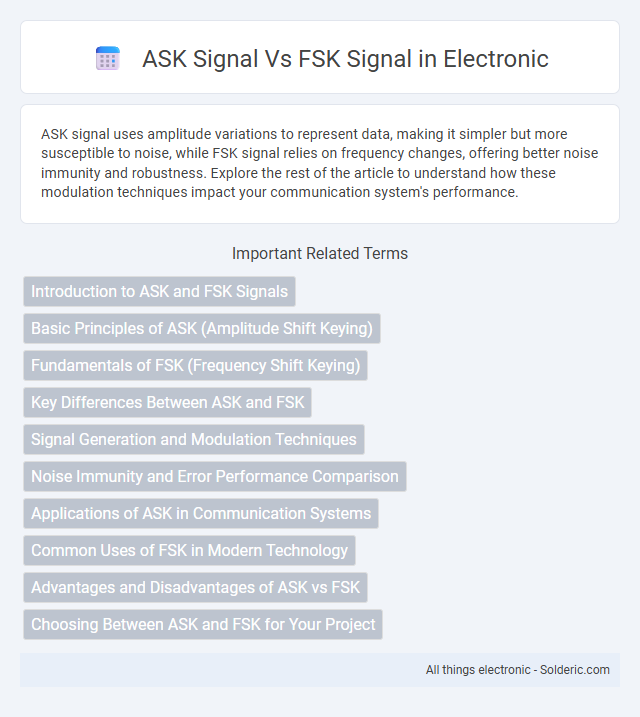ASK signal uses amplitude variations to represent data, making it simpler but more susceptible to noise, while FSK signal relies on frequency changes, offering better noise immunity and robustness. Explore the rest of the article to understand how these modulation techniques impact your communication system's performance.
Comparison Table
| Feature | ASK (Amplitude Shift Keying) | FSK (Frequency Shift Keying) |
|---|---|---|
| Modulation Type | Amplitude varies | Frequency varies |
| Signal Characteristics | Amplitude changes represent data bits | Frequency changes represent data bits |
| Noise Sensitivity | Highly sensitive to noise and amplitude distortion | More robust against noise and interference |
| Bandwidth Efficiency | Higher bandwidth efficiency | Lower bandwidth efficiency compared to ASK |
| Power Efficiency | Less power efficient due to amplitude changes | More power efficient with constant amplitude |
| Complexity | Simple to implement and demodulate | More complex modulation and demodulation |
| Applications | Low-speed data transmission, optical communication | Radio transmission, telemetry, wireless communication |
Introduction to ASK and FSK Signals
ASK (Amplitude Shift Keying) signal modulates data by varying the amplitude of the carrier wave, making it a simple and cost-effective method for digital communication. FSK (Frequency Shift Keying) signal modulates data by changing the frequency of the carrier wave between discrete values, providing better noise immunity and reliability. Your choice depends on factors like bandwidth efficiency and noise environment, with ASK favored for simplicity and FSK for robustness.
Basic Principles of ASK (Amplitude Shift Keying)
Amplitude Shift Keying (ASK) is a digital modulation technique where the amplitude of a carrier signal is varied in accordance with the binary data. Low amplitude represents a binary '0', while a higher amplitude represents a binary '1', allowing simple on-off keying implementation. ASK's efficiency in terms of bandwidth is moderate, but it is more susceptible to noise and signal fading compared to Frequency Shift Keying (FSK).
Fundamentals of FSK (Frequency Shift Keying)
Frequency Shift Keying (FSK) encodes data by shifting the carrier wave between different frequencies, representing binary values as distinct frequency tones. This modulation technique offers improved noise immunity and signal robustness compared to Amplitude Shift Keying (ASK), making it suitable for environments with high interference. FSK's fundamental principle relies on frequency variations rather than amplitude changes, enhancing signal clarity during digital communication.
Key Differences Between ASK and FSK
ASK (Amplitude Shift Keying) and FSK (Frequency Shift Keying) differ primarily in their modulation techniques, with ASK varying the amplitude of the carrier signal while FSK varies its frequency. ASK signals are simpler and more susceptible to noise, making them less reliable in noisy environments, whereas FSK offers better noise immunity and improved signal robustness. FSK is commonly used in applications requiring higher data integrity, such as digital radio transmissions, while ASK is often found in low-cost, short-range communication systems.
Signal Generation and Modulation Techniques
ASK (Amplitude Shift Keying) generates signals by varying the amplitude of a carrier wave to represent digital data, where the presence or absence of a carrier signal denotes binary values. FSK (Frequency Shift Keying) modulates the carrier wave by shifting its frequency between two distinct values corresponding to binary states, maintaining constant amplitude. Your choice between ASK and FSK modulation techniques depends on factors like noise immunity, bandwidth efficiency, and complexity of implementation in communication systems.
Noise Immunity and Error Performance Comparison
FSK signal offers superior noise immunity compared to ASK signal due to its frequency variations that are less susceptible to amplitude fluctuations caused by noise. The error performance of FSK is generally better, exhibiting lower bit error rates (BER) in noisy environments since frequency detection is more robust than amplitude detection. Consequently, FSK modulation is preferred in communication systems requiring reliable data transmission under noise-intensive conditions.
Applications of ASK in Communication Systems
ASK (Amplitude Shift Keying) signals find applications primarily in optical communication systems and RFID technology, where simplicity and cost-effectiveness are crucial. ASK modulation is widely used in low-frequency communication such as remote controls and garage door openers due to its straightforward implementation and efficient bandwidth usage. Though less resistant to noise than FSK (Frequency Shift Keying), ASK's compatibility with simple demodulation techniques makes it suitable for short-range, low-data-rate communication systems.
Common Uses of FSK in Modern Technology
FSK (Frequency Shift Keying) signals are widely used in modern technology for reliable digital data transmission, especially in applications like wireless communication, data modems, and RFID systems. Unlike ASK (Amplitude Shift Keying), FSK offers better noise immunity and is preferred in environments where signal stability is critical, such as in GPS and Bluetooth devices. Your devices benefit from FSK's robustness in maintaining data integrity over varying distances and interference levels.
Advantages and Disadvantages of ASK vs FSK
ASK (Amplitude Shift Keying) offers simple implementation and lower bandwidth requirements, making it suitable for low-cost and power-sensitive applications; however, it is more prone to noise and signal degradation in wireless communication. FSK (Frequency Shift Keying) provides greater noise immunity and better performance in noisy environments, enhancing signal reliability and data integrity, but requires more complex circuitry and wider bandwidth compared to ASK. The choice between ASK and FSK depends on trade-offs between complexity, robustness, and spectral efficiency in specific communication system requirements.
Choosing Between ASK and FSK for Your Project
ASK (Amplitude Shift Keying) signals offer simplicity and cost-effectiveness, making them ideal for short-range, low-data-rate applications with minimal interference. FSK (Frequency Shift Keying) provides greater noise immunity and reliability, suitable for environments with higher interference and longer communication distances. Selecting between ASK and FSK depends on factors such as signal robustness requirements, power consumption, complexity tolerance, and the specific communication environment of your project.
ASK signal vs FSK signal Infographic

 solderic.com
solderic.com